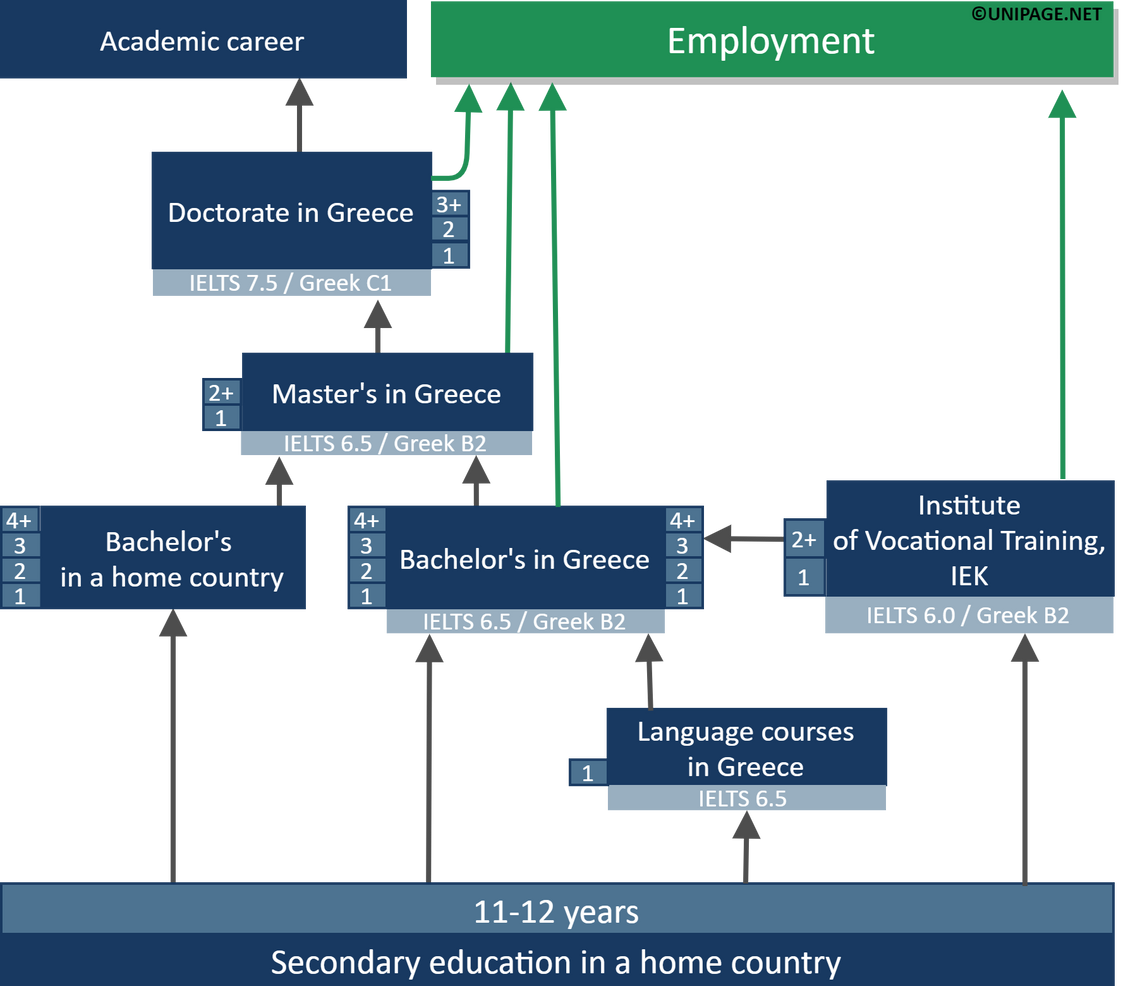
Briefly about higher education in Greece
- Education in Greece is suitable for those who prefer an independent approach to learning and have self-discipline. Starting from the first semester, students almost completely make up the schedule themselves, choosing electives, and sometimes even the time of classes. At the same time, self-education takes up more than half of the teaching hours.
- Price. Officially, education in public universities in Greece is free. Only the first year of language courses is paid for. Its cost is from 803 USD to 878 USD. The price of programs in private colleges varies depending on the level of education: from 7,494 USD to 12,847 USD/year, but it can be even higher.
- Requirements. For admission to a Bachelor's degree program, a certificate of complete secondary education is enough. Knowledge of the language is optional — a foreign student is given a year to learn Greek at the university.
- Language. The main language of instruction in the country is Greek. At private universities and at public universities at the Master's level, programs can be found in English.
- Private universities. The Greek Constitution does not recognize private higher education. All Greek universities are public. Existing private universities are registered in the country as commercial enterprises. Such universities are not licensed by the Ministry of Education. Their degrees are relatively recent in Greece and are still not as well accepted in the country as those from public universities.
Advantages of studying in Greece
- Tuition fees. Public Greek universities offer free education to all students, including foreigners.
- Lack of exams. Unlike Greek applicants who must pass the Panhellenic exams for admission, international students only need to have a decent GPA.
- Discounts and benefits. In Greece, students enjoy benefits for all types of transport, theaters, cinema, concerts, and other cultural events. They also receive free meals at university canteens and free study materials.
- Scientific tradition. Ancient Greece is the birthplace of modern European science and philosophy. Some classical traditions in education are still preserved in the country. For example, everyone has the right to freely attend lectures without enrolling in a program.
Disadvantages of studying in Greece
- Complicated admission procedure. Acceptance of documents for undergraduate programs lasts only 7 days. By this time, all certificates and documents should already have been prepared. Many of them will need to be collected and certified directly in Greece. After that, you need to register on the website of the Ministry of Education, fill out an application and send everything by courier to Greece or bring it in person.
- Language. You can come to study without knowing the Greek language, but in order to live comfortably in Greece, it is still better to learn it (at least to an intermediate level). At the same time, Greek is not the easiest language to learn. The main difficulties are long letter combinations, personal pronouns, and verb conjugation.
- Bureaucracy. Greece is the birthplace of democracy and a country of bureaucracy. Paperwork and long lines to resolve the simplest issue are the Greek accepted norm.
- Accommodation. Greek universities offer foreign students places in the dorms, but it is not always possible to get there: there are not enough rooms for everyone. For this reason, students often rent their own accommodation. This means additional expenses, as well as spending time and effort finding a suitable apartment. The most expensive rental price is in Athens and Thessaloniki. The average price for a room in Athens is 268-375 USD/month without utility bills.
Cost and structure of education in Greece
| Type of study | Age | Duration | Min. cost | Avg. cost | Level of language proficiency | Exams |
| Summer camp | 6+ | 1-3 weeks | 428 USD/week | 492 USD/week | A1 | - |
| Language schools | 16+ | 1-11 weeks | 257 USD/week | 343 USD/week | A1 | - |
| Secondary education | 12+ | 3-6 years | Free | 10,706 USD/year | B2 | Greek B2 / IELTS 6.5 |
| Bachelor’s | 17+ | 4 years | Free | 10,706 USD/year | B2 | Greek B2 / IELTS 6.5 |
| Master’s | 22+ | 1-2 years | Free | 3,747 USD/year | B2 | Greek B2 / IELTS 7.0 |
| MBA | 22+ | 1-2 years | 7,387 USD/year | 11,777 USD/year | B2 | Greek B2 / IELTS 7.0 |
| Doctorate | 24+ | 3 years | Free | 1,606 USD/year | C1 / C2 | Greek C1 / C2 / IELTS 7.5 |
Additional costs
| Exams | 86 USD |
|---|---|
| Accommodation | 268-375 USD/month |
| Utility bill | 54-161 USD/month |
| Meals | 118 USD/month |
| Insurance | 32 USD/month or from 161 USD/year |
| Study materials | Free |
| Transport | 32 USD/month |
The system of higher education in Greece is fully run by the state. One of its features is that religion and education are inseparable from each other. They are controlled by one body — the Hellenic Ministry of National Education and Religious Affairs. Education at the public universities is provided entirely in the Greek language. There are programs in English, but only in private colleges or in graduate schools, depending on the field of study.
Levels of higher education
The levels of higher education in Greece correspond to the universal European system:
- Bachelor's degree — undergraduate. The duration of studies is 3-4 years. For medical schools — 6 years and more.
- Master's degree — postgraduate. The studying lasts from 1 to 2 years.
- PhD. Programs last 3 years.
According to Greek law, an academic degree can only be awarded to students by public educational institutions: universities, academies, and polytechnics. In addition to public universities, there are also private schools and colleges in Greece. Many of them are branches of foreign universities. Greece only began to recognize their diplomas in 2012, and they are still considered inferior in quality to those obtained from public universities[1].
Academic grading in Greece
Options for university admission in Greece


Validation of foreign studies and degrees in Greece
Before applying for a higher education program in Greece, an applicant must go through the procedure of recognition of a degree.
For undergraduate studies. Apostille of the following documents is required:
- Certificate of complete secondary education;
- Birth certificate;
- Translation of grades.
Apostille is issued in the Greek embassy.
For graduate and doctoral studies. Apostille of the diploma is required, as well as its recognition. In Greece, it is carried out by a special agency — DOATAP. The procedure can take from 4 months to a year. If the university is accredited in Greece, and the program and subjects listed in the student's diploma coincide with the Greek ones, then there will be no difficulties with recognition. Otherwise, the applicant may be offered to take additional courses in order to compensate for the academic differences and confirm their degree.
Preparatory programs in Greece
There are no special preparatory programs for international students. You can enter a university without even knowing Greek. After enrolling in the course, students have one year to learn the language. The course usually takes place at the universities themselves. But there are only two universities that are licensed to conduct a Greek language exam: Athens Kapodistrias National University and Aristotle University in Thessaloniki.
The average cost of a language course is 878 USD/year; plus 80 USD for textbooks. After completing the language program, the student is obliged to pass a paid exam (75-86 USD). Having confirmed the B2 level, they have the right to start studying at the university from the next semester.
Vocational education in Greece
There are two main types of educational institutions for those wishing to obtain vocational education in Greece:
- Vocational Lyceums (EPAL; Epagelmatiko Lykio). They are part of the secondary education system. You can enter them after the 9th grade of a Greek or foreign school. There are no admission exams. The standard school curriculum is combined with specialty subjects. The duration of studies is 3 years. After graduating from a vocational lyceum, you can immediately go to work, enter a vocational training institute, a polytechnic university, or a university in a specialized direction.
- Institute of vocational training (IEK; Institute of vocational training). These institutions occupy a special niche of afterschool education (post-secondary education). Admission to IEKs is possible only at the age of 18 and with a certificate of complete secondary education. The duration of studies is 2-2.5 years. After graduating from IEK, you can get a job or immediately enroll in the 3rd year of a Bachelor's degree program corresponding to your diploma specialty.
Until 2019, there was another type of vocational education institution in Greece — the Technical Institutes (TEI). During an educational reform, they were all integrated into larger universities and polytechnics.
Vocational Education and Training (VET) is less popular among the Greeks than studying at a higher education institution. About 75% of young people choose to continue their studies at a university, considering vocational education as a fallback option[2]. This is due to the general idea that a university degree is more prestigious and gives more chances to get a job. In reality, graduates of colleges and IEKs find it is easier to get a job in Greece, but their diplomas still have a lower status than university degrees[3].

Bachelor's degree in Greece
Bachelor's degree is the first step in the higher education system. In Greece, Bachelor's programs last 4 years. The exception is some technical and engineering specialties — 5 years, and medical education — 6 years. Upon completing the course, the graduate receives a Bachelor's degree, which is called Ptychio in Greek.
Admission requirements
- Submission of documents. Documents are submitted not to a specific university, but directly to the Hellenic Ministry of National Education and Religious Affairs. In the application form students indicate up to 20 academic departments from different universities in order of priority. They will be enrolled in one of them based on the results of the competition.
- Competition. Admission to a Greek university for international students takes place without examinations. This means that the higher the average score in applicant’s educational certificate, the more chances he has to get to the desired university and department.
- Cost. Studying at Greek state universities is free for everyone.
Application requirements
- School leaving certificate validated by the competent educational authority of candidate’s country of residence;
- A certificate of GPA, translated into Greek grading system and ratified by the competent educational authority of candidate’s home country;
- A certificate confirming that candidate fully attended the last year of secondary school;
- Certificate of parents’ origin and citizenship to prove the absence of Greek roots;
- A certificate of being eligible for admission to higher education institutions in the home country;
- A certificate containing information about candidate’s curriculum in the secondary school;
- A certificate stating that the applicant has not previously studied at a higher educational institution in Greece and is not a graduate of a Greek school;
- Two photos;
- A photocopy of the passport and a photocopy of the visa if the applicant is in Greece at the time of application.
In Bachelor’s programs, there are a number of compulsory disciplines that depend on the field of study. In addition to them, starting from the first semester, students choose electives. The class hours are distributed so that more than half of the time is given to students for independent study. Attendance at lectures and seminars is often optional. For each subject taught during the semester, the students receive a certain number of ECTS — usually 10 per subject. To graduate, they need to collect at least 240 credits over 4 years of studies.
Master’s degree in Greece
Master’s program is the next level of education after getting a Bachelor's degree. The standard period of study for a Greek Master's degree is from 1 to 2 years (depending on the university and the program). For some specialties compulsory subjects still exist, but mostly Master's programs consist of electives. The student personally creates the curriculum according to their preferences. Lectures and seminars take up about 20% of the academic hours — the rest of the time is devoted to the independent study of subjects. The last semester is devoted to writing the graduate thesis.
Admission requirements
- Recognition of a foreign degree. If a student applies for a Master's program at a Greek university with qualifications from another country, then first they need to go through the procedure of recognition. It can take anywhere from 4 months to several years. Knowledge of the Greek language and passing exams is also required to successfully complete the process.
- Submission of documents. The application form and all the necessary documents are submitted directly to the university chosen by the student.
- Competition. As in the case of the Bachelor's degree, the official admission to a Master's program is based on the average score of the diploma, but many universities have additional requirements: a letter of recommendation, essay, motivation letter or a small written exam.
- Cost. The average tuition fee at a state university is 3,747 USD/year. In a private university, a Master's degree costs about 7,494-8,565 USD/year.
- Language. Universities offer Master's programs both in Greek and in English. Unlike the undergraduate program, where a student can enter without knowing the Greek language and take a year to study it, there is no such opportunity in the Master’s programs. If an applicant wants to study in a Greek program, then at the time of submission of documents they must already have a confirmed language proficiency level of B2.
Application requirements
- Passport + a photocopy;
- Translation of the Bachelor’s degree validated by the competent educational authority of candidate’s country of residence;
- Certificate of recognition of the diploma from DOATAP with the GPA listed;
- Language certificate (Greek B2 / IELTS 7.0);
- Additional documents depending on the requirements of the university:
- Personal application;
- Portfolio.
Doctorate in Greece — PhD
PhD is the final stage of higher education. It involves full immersion in the academic environment and research activities. Doctoral studies in Greece last 3 years and conclude with the defense of a thesis and obtaining a PhD degree. The main criterion for the successful completion of doctoral studies is the original contribution to a specific area of scientific knowledge. There are two types of doctoral programs in Greece:
- Classical. Takes 3 to 6 years. All the time of study is devoted to research and writing a thesis.
- American. Lasts a minimum of 4 to 5 years and is a combination of Master's and Doctoral studies. The student spends the first 3 years of the course attending lectures and seminars. Research activity begins in the second year of study and for some time goes in parallel with attending classes.
Admission requirements
- Recognition of a foreign diploma. If a student has a Master's degree from another country, then it must be recognized by a special agency — DOATAP. The procedure takes from 4 months to several years.
- Submission of documents. Documents are submitted to the university to the department where the candidate wishes to study.
- Competition. The conditions of the competition are determined by the universities themselves. Most often, they require an academic resume, a letter of motivation, and letters of recommendation.
- Cost. Depends on each specific university. Unlike the first and second stages of education, for which more or less common rules apply, universities determine the cost of programs for doctoral studies on their own. The average price is 1,606 USD/year.
- Language. There are doctoral programs in Greek and in English.
Application requirements
- Passport + a photocopy;
- Translation of the Master’s degree validated by the competent educational authority of candidate’s country of residence;
- Certificate of recognition of the diploma from DOATAP, with the GPA listed;
- Language certificate;
- Additional documents depending on the requirements of the university:
- Personal application;
Academic career
- Postdoc position. A kind of a bridge between doctoral studies and an academic career. There are few such positions in Greece. They mainly exist within the framework of projects funded by the EU, and provide a small income[4].
- Junior professor (Epikouros Kathigitis). To be considered for this position, the candidate must have a PhD degree, teaching or research experience of at least 3 years, as well as a monograph or publications in scientific journals (co-authorship is allowed)[5].
- Adjunct professor (Anaplirotis Kathigitis). This position can be assumed by a professor with work experience in a higher educational institution or in a research center for at least 4 years. They must have a decent portfolio: academic achievements, publications of monographs, and articles written by the candidate alone[5].
- Professor (Kathigitis). The highest position in the academic career. It is assigned to a professor with at least 6 years of teaching experience. At the same time, it is imperative that the candidate has led at least two different programs, taught a Master's course for 3 years, and also served in advisory committees for at least two successfully defended doctoral dissertations. The presence of numerous publications is required[5].

Scholarships and grants in Greece
Greece welcomes students from other countries and offers them financial assistance in the form of scholarships and study grants. The most famous among them:
- Scholarship of the Aristotle Onassis Foundation. For graduate students. Size — 642 USD/month. Requirements for programs change annually. You can check students from which programs can apply for a scholarship this year on the official website.
- Scholarship of the Aristotle University in Thessaloniki. It can be applied for by undergraduate and graduate students studying at the university for any of the programs. The amount of the scholarship is 369 USD/month for bachelors and 482 USD/month for masters. For more information, check the website of the university.
- State Scholarship Fund (IKY). Grants for young researchers. They are available to doctoral and graduate students enrolled in programs in History, Greek language, and literature, or Art. The amount of the scholarship is 642 USD/month.
To qualify for the scholarship, a student must have a range of qualities and academic achievements, ranging from high academic performance to scientific publications. Unfortunately, there is not enough information about the rules and conditions for the competition for many scholarships: it is often not updated on time and is presented exclusively in Greek. It is also important to know that although the Greek scholarships are large enough, they will not cover all tuition and living costs.
Student benefits and discounts
- Insurance and medical care. International students can get free insurance and emergency medical care. They also enjoy discounts when visiting doctors and purchasing prescription drugs.
- Food. In many universities, undergraduate and graduate students receive a free lunch in university canteens or pay a symbolic amount — 3 USD — for three meals a day.
- Educational materials. State universities provide the student with all the necessary study materials absolutely free of charge.
- Transport. All university students receive a discount on different types of transport: bus, train, ferry.
- Entertainment. Students are entitled to priority entrance to museums, exhibitions, concerts, and theaters.
Student visa to Greece
Students from countries outside the EU need a special visa to study in Greece. There are two types of student visas:
- Short Stay (Type C). Issued to students who visit Greece for the purpose of studying in preparatory or language courses, as well as for participating in conferences, symposia, and olympiads. The main condition for a type C visa is to stay in the country for no more than 90 days.
- Long-term (type D). Awarded to those who have been admitted to a Greek university as a full-fledged student in an undergraduate, MBA, graduate, or doctoral program. The visa is issued for one year. The student has the right to extend it in Greece, without returning to home country.
Those who are not citizens of an EU or EEA country, for a long-term stay in Greece, must apply for a residence permit. After submitting the application, the student receives a "ble veveosi" (μπλε βεβαίωση) — a certificate of waiting for a residence permit. It gives the right to live and study in Greece, get a job, as well as fly to other countries. The residence permit for students of higher educational institutions is valid for 1 year and requires regular renewal[7].
Documents for the type C visa
- Application form;
- A valid passport with 2 blank pages;
- Two 35x45 ICAO photographs;
- Civil passport + all pages’ photocopies;
- Receipt for payment of visa fee from 40 to 86 USD depending on the country of residence;
- Medical insurance policy covering the entire period of study;
- Letter of invitation from the Greek side;
- Personal solvency certificate or a sponsorship letter with a document confirming the sponsor's solvency.
Documents for the type D visa
- Application form;
- A valid passport with 2 blank pages;
- Two 35x45 ICAO photographs;
- Civil passport + all pages’ photocopies;
- Receipt for payment of visa fee 96 USD;
- Medical insurance covering the entire period of study. The minimum coverage is 32,118 USD;
- Letter of invitation from Greece;
- Personal solvency certificate or a sponsorship letter with a document confirming the sponsor's solvency. The minimum amount on a bank account is from 5,353 USD;
- Copies of parents' passports, if they provide financial support, and proof of relationship;
- A document stating the intended place of residence in Greece;
- Certificate of good conduct;
- Health certificate.
Opportunities to work while studying in Greece
For non-EU nationals, a long-term visa gives the right to work up to 20 hours a week, and up to 40 during holidays. If desired, a student can get a job during studies, but it is not always easy to combine them due to the high academic workload. In addition, the country's economy has not yet recovered from the crisis, so finding a suitable job is not easy.
The most suitable option for a student is a summer part-time job. The tourist season (May to October) brings with it many temporary job openings. People with knowledge of a foreign language are especially appreciated, as tourists arrive in Greece from different parts of the world. The most common summer part-time jobs for students are: a waiter, entertainer, hotel worker, guide, bartender, or shop assistant. Officially, students can only work part-time, but in fact, everything depends on the employer. Often the contract is drawn up for half an hour, but the student works full time. The minimum wage in Greece is 696 USD/month[8].
Documents for employment
- Residence permit or veveosi — a certificate of waiting for a residence permit;
- Sanitary book made in Greece;
- National security (AMKA);
- Insurance number (AFM);
- Work permit from the local police station.

Job prospects and opportunities in Greece
In Greece. A foreigner with a Greek diploma can get a job on his own, apply to a job center or even open a business, which is extremely popular in Greece. Graduate employment centers operate at Greek universities, and job fairs are often held where you can find an internship or a permanent place of work.
There is a huge demand in the country for specialists in the service sector, medicine, logistics, programming, technical activities, agriculture, and tourism[9]. The most profitable professions are executive managers, lawyers, engineers, sales and financial services workers[10].
In Europe. Officially in Greece, you can get a European Blue Card (EU Blue Card), which gives a residence permit and the right to work in the EU, but in Greece such cards are rarely issued.
Greece participates in the Bologna Process and local university degrees are internationally recognized. Universities in Greece produce good specialists, especially in the fields of Medicine and Engineering. In these areas, a Greek degree will be an advantage for employment in Europe. Of course, you can find work in other areas as well. It is not so much the education of the candidate that is important as their competence and personal qualities. Please remember that working in another European country will require knowledge of the relevant language or an excellent level of proficiency in English.
Want to study at a foreign university but don't know where to start? We can help!
Our specialists will find a university, arrange your documents, fill out the applications, and stay in touch until you receive an offer.











